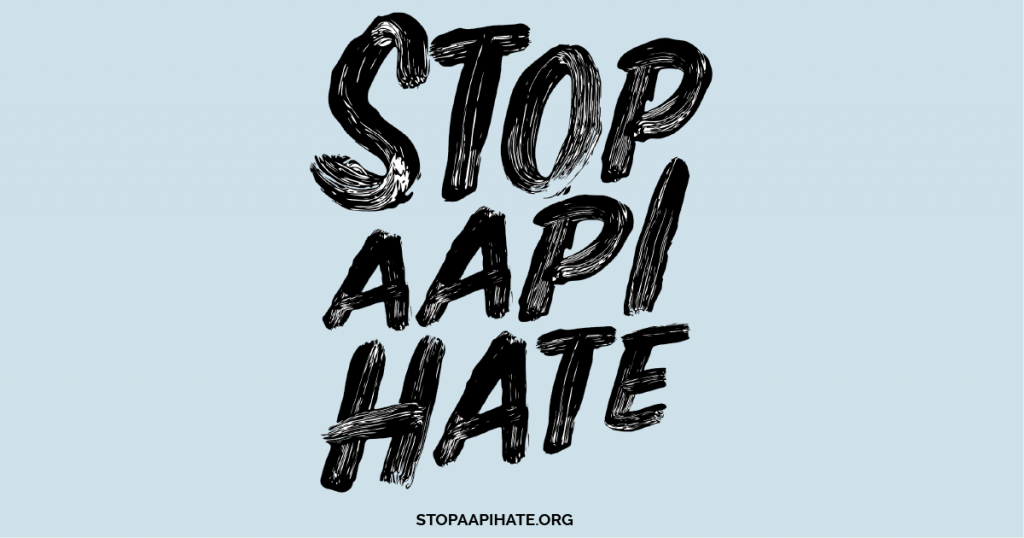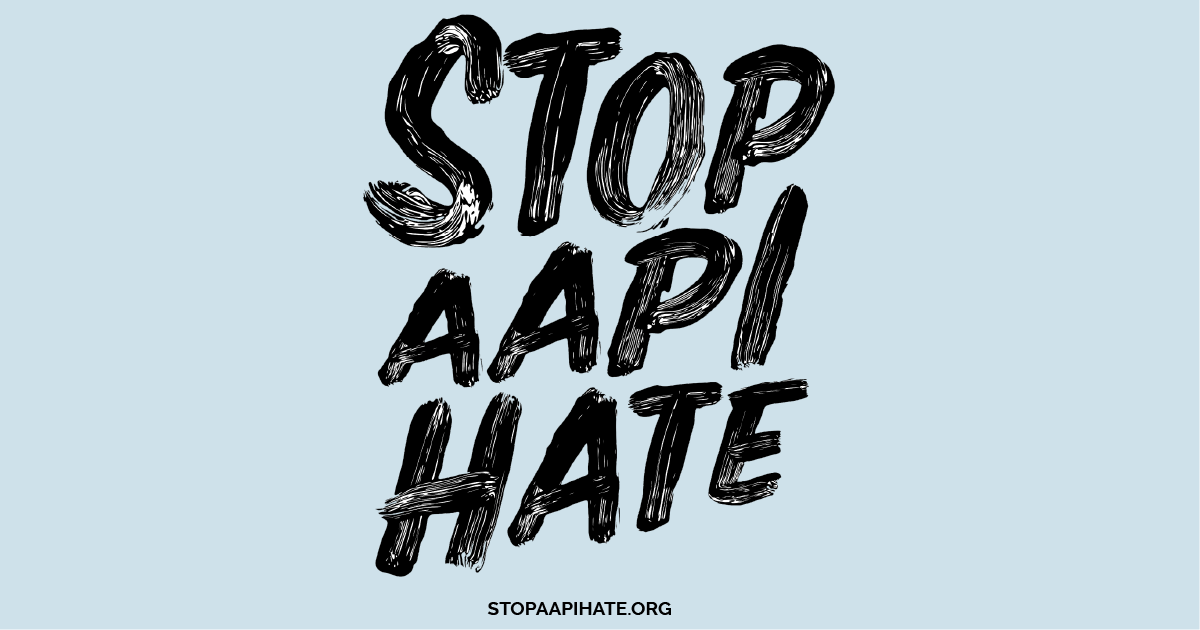Statement from the Center for Understanding in Conflict

We stand in solidarity with Asian American and Pacific Islander (AAPI) communities and individuals. At the Center for Understanding in Conflict, we recognize that our AAPI members, colleagues, friends, and families have long faced injustice, xenophobia, and violence, and our society is past due in reckoning with the deep-rooted racism that is fomenting acts of hate and violence.
According to a 2020 survey, 76% of Asian Americans polled expressed worry of experiencing hate crimes, harassment, and discrimination because of COVID-19. Since March 2020, the organization Stop AAPI Hate has received more than 3,800 reports of incidents of hate. As xenophobia rose in the wake of COVID-19, and despite AAPI groups and individuals sounding the alarm at the rise in hate and harassment, these dangers have been largely ignored by society. Then, in Atlanta, the lives of eight people were violently ended—Daoyou Feng, Suncha Kim, Paul Andre Michels, Hyung Jung Park, Julie Park, Xiaojie Tan, Delaina Ashley Yaun, and Yong A. Yue.
The names and stories of the victims of the shootings in Atlanta, which included six women of Asian descent, made headline news first shared by Korean media outlets, while the U.S. media mostly focused on the shooter and opted to quote law enforcement. This continues a tradition of the erasure of Asian Americans in mainstream society. Further, media coverage included law enforcement statements reinforcing stereotypes that in turn were splashed across media outlets seen by millions. Even as the deadly consequences of hate captured the attention of the nation, the violence persists—for example in an attack on an elderly Asian woman in New York City last week.
Racism, xenophobia, and violence against AAPI communities is deeply woven into the fabric of American history—a history largely left out of American education, fueling the cycle of racism and violence. The mainstream has forgotten the lynching of 17 Chinese men by a white mob in 1871 Los Angeles, has glossed over in WWII history the stories of the over 110,000 Japanese Americans—including children—dispaced from their homes to internment camps, and has ignored countless stories showing the danger and violence of bigotry and white supremacy.
The current hate facing Asian Americans and Pacific Islanders is part of this legacy. To interrupt these dynamics, we must learn about and understand how these centuries of racism intersect with other dynamics, such as sexism, to fuel the current violence. At the Center for Understanding in Conflict, we recognize that we still have a long way to go and we are committed to work on correcting our biases, dismantling our complacency, and taking the actions required to be a more just, equitable, and inclusive organization. For our dear members, friends and family in the AAPI communities, we are here for you and we support you.
My Plea
Oh, God, I pray that someday every race
May stand on equal plane
And prejudice will find no dwelling place
In a peace that all may gain.
– Mary Matsuzawa
Matsuzawa was a young woman when she was forced into a Japanese internment camp during World War II.
Things you can do
We want to thank the San Francisco Zen Center, who has compiled this list and have given us permission to republish.
1. Reach out to friends and family members of Asian descent
- You might say something like, “Are you OK?” or “Would you like to talk” or “This must be tough and I’m sorry you are going through this” or ‘”I don’t know exactly what you are going through, but I am always here to help” or “You really matter to me” or “How can I help, if at all.”
- What leaders can do – The simplest thing managers and organizational leaders can do for their Asian American employees is to use their privilege to acknowledge the recent news of anti-Asian violence, and give space for impacted individuals to process, grieve and heal. (Read: How to support Asian American Colleagues by Jennifer Liu, CNBC)
- Hold a ceremony to honor and remember victims of anti-Asian hate crimes
- Support Asian-owned local businesses (e.g., SF Chinatown is struggling)
2. Raise awareness, speak up, and condemn anti-Asian racism
- Read and share these articles on the rise of recent anti-Asian violence
- Watch / Listen and share these video and audio
- Korean American actor Daniel Dae Kim gives an impassioned speech (5 min) at the congressional hearing on the recent surge of anti-Asian hate crimes.
- Watch “We are dying to be heard” (Video)
Interview with Activist and Nobel Peace Prize nominee Amanda Nguyen - How to address the surge of anti-Asian hate crimes (Video, 26 minutes) – A Nobel Peace Prize Nominee Amanda Nguyen and AAPI activist Helen Zia
- Listen to The surge of anti-Asian violence (spotify) Today, Explained with Jeff Chang
- Listen to Anti-Asian Hate Crimes Rise Dramatically Amid Pandemic (podcast) NPR
- New links (03/29/2021)
- LIVE Q&A: How to address the surge of anti-Asian hate crimes – Interview with AAPI Activist Helen Zia and Amanda Nguyen
- Sign and share these petitions to raise awareness and stop anti-Asian racism
- Participate in non-violent protests and spread the word about when they are happening
3. Report Instances of anti-Asian violence
- Report them at StopAAPIHate.org
4. Receive Bystander Intervention Training
- Receive free one-hour trainings bystander intervention hosted by Hollaback!
- Read 5Ds of Bystander Intervention (PDF)
5. Learn about AAPI and discrimination
- Poll: 1 out of 4 Asian Americans has experienced a hate incident
- ‘Model Minority’ Myth
- ‘Model Minority’ Myth Again Used As A Racial Wedge Between Asians And Blacks
By Kat Chow, NPR - The mental health toll of being a ‘model minority’ in 2020
By Kimmy Yam, NBC
- ‘Model Minority’ Myth Again Used As A Racial Wedge Between Asians And Blacks
- History
- The 1982 Murder of Vincent Chin (video, 5 min)
- America’s long history of scapegoating its Asian citizens
National Geographic - The history of attacks against Asian Americans is complicated
By Harmeet Kaur, CNN - The Muddled History of Anti-Asian Violence
By Hua Hsu, The New Yorker (PDF) - The long history of racism against Asian Americans in the U.S.
PBS - Watch PBS Documentary “Asian Americans”
- Asian Women
- Why Asian women are uniquely vulnerable to violence
By Harmeet Kaur, CNN
- Why Asian women are uniquely vulnerable to violence
- Solidarity, Allyship
- Opinion/We Need to Put a Name on this Violence
By Jay Caspian Kang, The New York Times (PDF)
- Opinion/We Need to Put a Name on this Violence
- American Buddhism
- Anti-Asian Violence Is an Attack on Us All
By Cristina Moon, Lion’s Roar - Searching for Asian American Buddhists
By Chenxing Han, Lion’s Roar - We’ve Been Here All Along
By Funie Hsu, Lion’s Roar
- Anti-Asian Violence Is an Attack on Us All
6. Support, donate, and volunteer with organizations working to overcome racism towards AAPI
- Stop AAPI Hate serves as the leading aggregator of anti-Asian hate incidents, shares informational reports and press releases, and offers a range of supports to the AAPI community
- GoFundMe.com/aapi – You can donate to the AAPI Community Fund or directly to the victims of Anti-Asian Violence.
- Hella Heart Oakland supports mental health and wellness initiatives for Asian/Asian American women and girls in Oakland who may suffer from mental illness and other hardships.
- Oakland Chinatown Safety Fund is raising funds for security cameras, community ambassadors and safety awareness programs.
- Compassion in Oakland provides the Oakland Chinatown Community with a resource for promoting safety and community to the forgotten, underserved, and vulnerable.
- Hate is a virus – started as a grassroots movement to combat racism and xenophobia against Asian Americans and Pacific Islanders (AAPI) fueled by COVID-19, Hate is a virus has evolved into a sustainable organization that addresses xenophobia and hate in the AAPI and BIPOC communities.
- Act To Change – a national nonprofit organization working to address bullying, including in the AAPI community. They published “The Racism is a Virus Toolkit” to support the community in combating racism.
- Asian Americans Advancing Justice – a national nonprofit organization that focuses on housing rights, immigration, civil rights, labor rights, and others for Asian Americans
- National Council of Asian Pacific Americans – a nonprofit organization that serves to represent the interests of the greater Asian American (AA) and Native Hawaiian Pacific Islander (NHPI) communities through a coalition of 37 national Asian Pacific American organizations around the country.
Press Release, Data
- Stop APPI Hate Press Release (March 16, 2021) (PDF)
- Stop APPI Hate Press Release (PDF)
- Stop APPI Hate – Links to reports and press releases
- Hella Heart Oakland – Facebook page for local networking
- Higashi Honganji Temple, LA – Bishop Noriaki Ito’s Statement in response to vandalism of the temple

